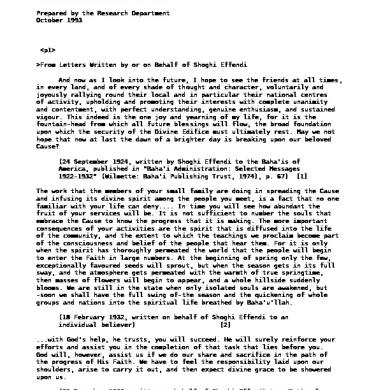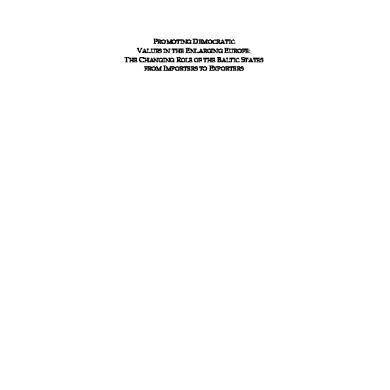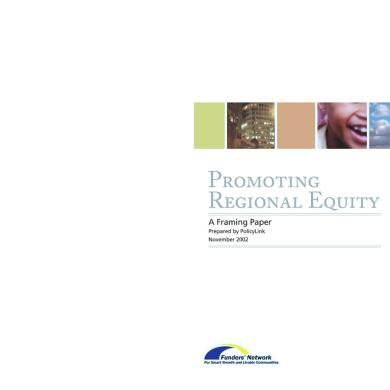Promoting Education
This document was uploaded by user and they confirmed that they have the permission to share it. If you are author or own the copyright of this book, please report to us by using this DMCA report form. Report DMCA
Overview
Download & View Promoting Education as PDF for free.
More details
- Words: 1,283
- Pages: 5
Promoting Education Education plays a vital role in many different arenas of development. Talking in a broader sense, the impact of education is not only at individual level but also influences the Economic success and stability of a country. Education empowers an individual and is seen as a foundation of a healthy wealthy society. Education has a profound impact over many Great Economies like United States of America, United Kingdom, Japan, France, Germany to quote a few. These developed economies have touched the sky just because of their adequate Education System. Talking of India, an erudite country which never ceases to fascinate, the education here is one among the other several elements that captures attention of the world. Although there are large number of illiterates here, but other countries are astonished by the quality of the human resources that the Indian education system has produced. The traditional ancient system of education in India was based upon the ‘Gurukul’ system, where the child in his Bramahcharya stage had to leave his home and live along with his Guru, the Teacher in his ‘asharam’. Although ancient India had produced great Scholars, but the women and lower castes gradually lost their right to educate themselves. But it is the English language and the reformation movements of the 19th century that started demolishing the differences between the upper and lower caste. The Britishers though rightly criticized for wrecking the Indian economy, can be acknowledged for bringing a new revolution in the Indian Education System.
Soon after the country got independence in the year 1947, providing education to all was the primary issue of the government. The government made the discrimination between the castes as an unlawful act. The 86th constitutional emendation has made the elementary education a fundamental right for the children between 6-14 years of age. The literacy rate of India according to the 2001 census is 65.38%. The male literacy rate had increased to 75.85% and shows an increase of 11.72%. On the other hand, female literacy rate have reached 54.16% and shows an increase of 14.87%. India had produced many great scholars and it still maintains its reputation in the field of education. The education system here is considered as one of the best way of providing knowledge to the children. Still great scholars are emerging from this outstanding country. As an example, Chemistry Nobel Prize 2009 is bagged by Dr. Venkatraman Ramakrishnan for mapping ribosomes at the atomic level. The current President of United States of America, Barack Obama, also remarked that education is a very important concern for America presently in order to compete with India and China. He commented “a child in Boston now needs the training to compete with the kids getting an equal or better education in Bangalore or Beijing.” This may be a matter of concern for the American economy but it is a positive sign for us and connotes that education is an important aspect of succeeding in such a competitive world. In the 19th century, America was a leading hero of the universal basic education. And in the following years after the World War II, America built a commanding position in higher education. But as time passed, over these 30 years, there have been a gradual educational neglect. America which used to lead in educating its young children is now left behind by some advancing countries, which include India as well. People still have an image of America as a great land of education.
That image used to correspond reality in past. These days, young Americans compared with the children of other countries are less likely to graduate from college. In fact, America has a college graduation rate slightly below average across all advanced economies. By the effects of current crises, America has fallen further in these rankings.
Because of the weak social safety net and limited student aid, American students hold part time jobs while attending their classes. Moreover, because of financial pressures, young Americans are more likely to become full time workers. While in India, government is taking some strict measures in order to educate weaker classes and has reserved some percentage of seats for some educationally backward classes. This system was founded in order to provide education to the Schedule Castes and Schedule Tribes. Indian System of Education is dedicated only on one simple word “talent”. The educational body in India basically assesses and tries to reveal the Talent that is hidden in each and every child. Reservation of seats is mainly meant for giving the opportunities to those students who belong to educationally backward classes, so as to unleash their talent and creativity. According to Bureau of Labour Statistics, the U.S economy lost 273,000 jobs last month. Of these lost jobs, 29,000 were in state and local education. That may not sound much, but education is one of those areas that should, and normally does keep growing even during a recession. Currently the whole world is affected by the current crises. While the countries are struggling to overcome these economic crises, India is already out of this Recession period and was not much affected by the erosion that took place in September 2008.
Education is one of the keys through which America has succeeded. Education made America great; neglect of education may reverse the process. India now is a holy land of education, with 17,000 colleges, 400 universities, 13 institutes of national importance and many other vocational institutes. The higher educational system in India is one of the largest in the world. The education system in India savored a special and a beautiful bond between a teacher and a student since time unknown. The students or ‘shishya’, as was called in ‘Gurukul’ system, regard their teacher with the feeling of respect and reverence. In ancient times, a shishya could go to any extent as instructed by his teacher and could not ignore his teacher’s instruction. And after learning the values given by his Guru, the shishya had to repay his Guru, as a part of the acknowledgement. This tradition is called ‘gurudakhshina’. The repayment is not necessarily monetary, it may be any task that teacher may want the student to perform. This tradition is no longer performed. But there still exists a wonderful bonding between a student and a teacher in which the student pays full respect to his teacher. India is becoming a big education hub in the world. And with this, the Indian economy is also observing a rise in growth rate. If the economic growth of India continues to go up, India will soon occupy the top position in the education sphere and will also experience high economic success. A noting point is that Economic success of a country and its Education system both are mutually dependent on each other. Educating people will and always help us to build a peaceful society and a powerful country. Indian Government is already taking some steps forward to promote education and it should add the education system in its priority list. Though government is taking actions to educate each and every Indian but still there exist many illiterates in our country starving for education. Education is a fundamental and moral right of all the citizens of India and they should exploit the government plans of education and should educate
themselves and their families. Not only the government but the citizens of India must also realize the importance of Education. Promoting Education is indeed a noble cause and all of us must join our hands to promote it. There are many non-profit non government organizations that are sincerely working on this common cause and are bringing a new positive revolution in our country.
Soon after the country got independence in the year 1947, providing education to all was the primary issue of the government. The government made the discrimination between the castes as an unlawful act. The 86th constitutional emendation has made the elementary education a fundamental right for the children between 6-14 years of age. The literacy rate of India according to the 2001 census is 65.38%. The male literacy rate had increased to 75.85% and shows an increase of 11.72%. On the other hand, female literacy rate have reached 54.16% and shows an increase of 14.87%. India had produced many great scholars and it still maintains its reputation in the field of education. The education system here is considered as one of the best way of providing knowledge to the children. Still great scholars are emerging from this outstanding country. As an example, Chemistry Nobel Prize 2009 is bagged by Dr. Venkatraman Ramakrishnan for mapping ribosomes at the atomic level. The current President of United States of America, Barack Obama, also remarked that education is a very important concern for America presently in order to compete with India and China. He commented “a child in Boston now needs the training to compete with the kids getting an equal or better education in Bangalore or Beijing.” This may be a matter of concern for the American economy but it is a positive sign for us and connotes that education is an important aspect of succeeding in such a competitive world. In the 19th century, America was a leading hero of the universal basic education. And in the following years after the World War II, America built a commanding position in higher education. But as time passed, over these 30 years, there have been a gradual educational neglect. America which used to lead in educating its young children is now left behind by some advancing countries, which include India as well. People still have an image of America as a great land of education.
That image used to correspond reality in past. These days, young Americans compared with the children of other countries are less likely to graduate from college. In fact, America has a college graduation rate slightly below average across all advanced economies. By the effects of current crises, America has fallen further in these rankings.
Because of the weak social safety net and limited student aid, American students hold part time jobs while attending their classes. Moreover, because of financial pressures, young Americans are more likely to become full time workers. While in India, government is taking some strict measures in order to educate weaker classes and has reserved some percentage of seats for some educationally backward classes. This system was founded in order to provide education to the Schedule Castes and Schedule Tribes. Indian System of Education is dedicated only on one simple word “talent”. The educational body in India basically assesses and tries to reveal the Talent that is hidden in each and every child. Reservation of seats is mainly meant for giving the opportunities to those students who belong to educationally backward classes, so as to unleash their talent and creativity. According to Bureau of Labour Statistics, the U.S economy lost 273,000 jobs last month. Of these lost jobs, 29,000 were in state and local education. That may not sound much, but education is one of those areas that should, and normally does keep growing even during a recession. Currently the whole world is affected by the current crises. While the countries are struggling to overcome these economic crises, India is already out of this Recession period and was not much affected by the erosion that took place in September 2008.
Education is one of the keys through which America has succeeded. Education made America great; neglect of education may reverse the process. India now is a holy land of education, with 17,000 colleges, 400 universities, 13 institutes of national importance and many other vocational institutes. The higher educational system in India is one of the largest in the world. The education system in India savored a special and a beautiful bond between a teacher and a student since time unknown. The students or ‘shishya’, as was called in ‘Gurukul’ system, regard their teacher with the feeling of respect and reverence. In ancient times, a shishya could go to any extent as instructed by his teacher and could not ignore his teacher’s instruction. And after learning the values given by his Guru, the shishya had to repay his Guru, as a part of the acknowledgement. This tradition is called ‘gurudakhshina’. The repayment is not necessarily monetary, it may be any task that teacher may want the student to perform. This tradition is no longer performed. But there still exists a wonderful bonding between a student and a teacher in which the student pays full respect to his teacher. India is becoming a big education hub in the world. And with this, the Indian economy is also observing a rise in growth rate. If the economic growth of India continues to go up, India will soon occupy the top position in the education sphere and will also experience high economic success. A noting point is that Economic success of a country and its Education system both are mutually dependent on each other. Educating people will and always help us to build a peaceful society and a powerful country. Indian Government is already taking some steps forward to promote education and it should add the education system in its priority list. Though government is taking actions to educate each and every Indian but still there exist many illiterates in our country starving for education. Education is a fundamental and moral right of all the citizens of India and they should exploit the government plans of education and should educate
themselves and their families. Not only the government but the citizens of India must also realize the importance of Education. Promoting Education is indeed a noble cause and all of us must join our hands to promote it. There are many non-profit non government organizations that are sincerely working on this common cause and are bringing a new positive revolution in our country.
Related Documents

Promoting Education
June 2020 8
Promoting Investment
October 2019 20
Promoting Entry By Troops
October 2019 7
Promoting Democratic Values
April 2020 1
Promoting Regional Equity
November 2019 9More Documents from ""

Promoting Education
June 2020 8
Seminar On Multistoried Building Petronas Towers
June 2020 6
John Hancock Centre
June 2020 7
Traffic Nd Traspo
June 2020 2

